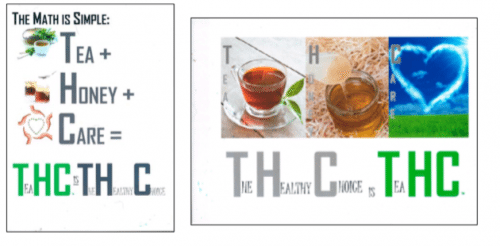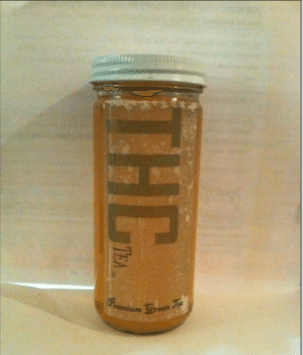The Trademark Trial and Appeal Board (TTAB) of the United States Patent and Trademark Office (PTO) recently affirmed the refusal to register the mark THCTEA, holding that it is “deceptively misdescriptive” when used in connection with tea-based beverages. The Applicant—Christopher Hinton—is, according to marijuanafreepress.com, the acting editor for the Marijuana Free Press.
THCTEA’s journey through the trademark system has been an uphill battle.The mark was first refused by the PTO back in September 2012, for being “merely descriptive” and for “plainly indicat[ing] that Applicant’s…goods include…THC.” One pre-requisite for trademark registration is lawful use of the mark in commerce. The problem in this case was that goods containing THC (tetrahydrocannabinol, the active ingredient in marijuana) are illegal under federal law, so it would be impossible for the Applicant to show lawful use of the mark if the product did indeed contain THC.
Here is where things become interesting. The Applicant responded by clarifying that his beverages do not actually contain THC. Accordingly, the PTO rescinded its refusal based on unlawful use, but raised a new ground for refusal, based on the Applicant’s own admission: Using THCTEA on a beverage that contains no THC is deceptively misdescriptive.
Deceptively misdescriptive marks have two key features: they misdescribe a significant characteristic of the goods associated with the mark (the “misdescriptive” part); and they are likely to cause reasonable consumers to purchase the goods, believing that the goods contain the misdescribed trait (the “deceptive” part). For example, LOVEE LAMB was held to be deceptively misdescriptive for seat covers that were not actually made of lamb’s wool. On the other hand, WOOLRICH was held not to be deceptively misdescriptive for clothes made out of cotton. In close cases, good lawyering can make a big difference.
After the PTO issued a final refusal, the Applicant appealed to the TTAB. On appeal, the Applicant re-alleged his previous arguments: “The characteristics of Applicant’s goods are such that they are suggestive” and “the product does not contain the controlled substance THC…THC is an abbreviation for ‘The Honey Care Tea.’” The TTAB was unpersuaded, and affirmed the PTO’s refusal.
Regarding the misdescription, the TTAB held that “it is plausible that tea-based beverages could contain THC” (albeit illegally) and that “THCTEA, when used for tea-based beverages, is merely descriptive for tea containing THC as a significant ingredient.” Apparently, recipes for THC-containing tea from such websites as grasscity.com, thestonercookbook.com, and 420magazine.com are sufficient to persuade the government that THC-containing tea is plausible. We were unable to find a recipe for THC-containing tea on marijuanafreepress.com.
Regarding deception, the TTAB agreed with the PTO that consumers would be likely to buy THCTEA beverages believing that they contain THC. The TTAB reasoned that, in light of the liberalization of marijuana policy in the United States, “a reasonably prudent consumer would be likely to believe that Applicant’s…beverages contain THC.”
In what probably comes as no surprise, neither the PTO nor the TTAB bought the Applicant’s argument that “THC” stands for “Tea Honey Care,” or that “THCTEA” stands for “The Honey Care Tea.” Apparently, the Applicant’s “example advertisements” (below) were unpersuasive:
Additionally, the specimen (below) that the Applicant submitted to the PTO probably did not help his “Tea Honey Care” argument:
THCTEA illustrates an interesting Catch-22 for descriptive marks that reference controlled substances. If you do put the controlled substance in your goods, you can’t claim lawful use of your mark in commerce. If you don’t put the controlled substance in your goods, your mark may be deceptively misdescriptive.





At the end of the day, it’s a cheeky way to get around regulation and while I don’t like the idea of policing abbreviations, it’s not something for kids to see and that is more important.